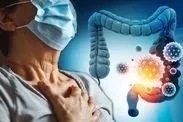Long COVID News: New York Study Shows That Gastrointestinal Along With Hepatobiliary Symptoms And Disorders Are Common In Long COVID
Long COVID News - Gastrointestinal & Hepatobiliary Issues Mar 06, 2023 2 years, 11 months, 1 week, 1 day, 1 hour, 16 minutes ago
Long COVID News: A new study by researchers from the Division of Gastroenterology and also the Division of Pathology at Donald and Barbara Zucker School of Medicine at Hofstra/Northwell, Northwell Health System, Hyde Park, New York-USA has found that gastrointestinal and hepatobiliary symptoms and disorders are common in Long COVID.

As the COVID-19 pandemic continues to ravage the world, researchers are beginning to uncover the long-term effects of the disease on those who have recovered. One of the areas that have been of particular interest is the gastrointestinal and hepatobiliary symptoms and disorders that some patients experience even after they have been cleared of the virus.
The study, which was published in the peer reviewed Journal of Clinical and Translational Hepatology, looked at 132 patients who had recovered from COVID-19 but were still experiencing gastrointestinal and hepatobiliary symptoms after 12 weeks or more.
https://www.sciencedirect.com/science/article/pii/S0889855322000668
The study team found that these symptoms were more common in patients who had severe COVID-19 and required hospitalization. However, they also found that even those with mild or asymptomatic COVID-19 could experience these symptoms.
Importantly, the most common gastrointestinal symptoms reported by the patients were diarrhea (43%), abdominal pain (27%), and loss of appetite (24%).
In addition, some patients also reported nausea, vomiting, and acid reflux. These symptoms were persistent, with some patients experiencing them for up to 24 weeks after their initial COVID-19 diagnosis.
The study findings also showed that some patients had evidence of liver injury, such as elevated liver enzymes, which could indicate hepatobiliary involvement in COVID-19. This was more common in patients who had severe COVID-19 and required hospitalization. However, even patients with mild or asymptomatic COVID-19 could have abnormal liver function tests.
Past
Long COVID News coverages have also covered as to how COVID-19 can affect the liver and also the gastrointestinal tract and cause various health and medical conditions.
https://www.thailandmedical.news/news/breaking-covid-19-news-brazil-study-shows-that-most-long-covid-individuals-continue-to-sustain-damaged-liver-functions-up-to-20-months
https://www.thailandmedical.news/news/breaking-autopsy-studies-by-king-s-college-london-reveal-that-covid-19-is-causing-severe-gastrointestinal-damage-especially-on-the-ileal-peyers-s-patc
ischemia-and-gastrointestinal-issues-in-asymptomatic-individuals-who-continue-to-test-negative">https://www.thailandmedical.news/news/breaking-study-shows-that-covid-19-can-cause-intestinal-ischemia-and-gastrointestinal-issues-in-asymptomatic-individuals-who-continue-to-test-negative
https://www.thailandmedical.news/news/new-york-university-study-finds-that-sars-cov-2-infection-causes-gut-microbiome-dysbiosis-that-increases-risk-for-bacterial-infections
https://www.thailandmedical.news/news/covid-19-research-american-study-confirms-sars-cov-2-infection-via-the-human-gastrointestinal-tract-and-also-explains-the-causes-of-diarrhea-
https://www.thailandmedical.news/news/case-reports-documenting-covid-19-patients-developing-mesenteric-panniculitis-and-acute-abdominal-pain-as-infection-progresses
https://www.thailandmedical.news/news/harvard-and-mayo-researchers-say-a-large-number-of-individuals-will-end-up-with-irritable-bowel-syndrome-ibs-as-a-result-of-sars-cov-2-infections
https://www.thailandmedical.news/news/warning-sars-cov-2-infections-causes-intestinal-ischemia-increases-disease-severity-and-risk-of-mortality
https://www.thailandmedical.news/news/covid-19-is-also-able-to-cause-gastric-reflux
https://www.thailandmedical.news/news/covid-19-research-disruption-of-gut-microbiome-could-be-also-be-a-contributing-factor-to-disease-severity-in-covid-19-patients
https://www.thailandmedical.news/news/covid-19-news-emerging-studies-shows-sars-cov-2-attacks-the-digestive-tract-especially-the-intestines-directly,-reported-case-of-bowel-perforation
https://www.thailandmedical.news/news/post-covid-19-individuals-advised-to-take-probiotics-as-study-shows-sars-cov-2-induced-gut-microbiome-dysbiosis-increases-risk-for-colorectal-cancer
https://www.thailandmedical.news/news/breaking-covid-19-gut-infection-remains-even-after-the-virus-is-cleared-from-respiratory-system-stool-testing-might-be-more-accurate-than-nasal-swabs
https://www.thailandmedical.news/news/covid-19-research-worrying-gastrointestinal-abnormalities-revealed-in-abdominal-imaging-studies-of-covid-19-patients
https://www.thailandmedical.news/news/covid-19-clinical-care-acute-gastrointestinal-injury-occurs-in-almost-86-percent-of-critical-condition-covid-19-patients,-often-leading-to-sepsis-and-
https://www.thailandmedical.news/news/breaking-new-studies-shows-how-coronavirus-affects-gi-tract-and-also-highlights-fecal-transmissions-as-another-route-for-viral-spread
The study findings are significant because they indicate that COVID-19 can have long-term effects on the gastrointestinal and hepatobiliary systems, even in patients who experienced only mild or asymptomatic cases. Furthermore, the study underscores the need for continued monitoring and follow-up care for patients who have recovered from COVID-19.
One of the most important implications of this study's findings is that physicians must remain vigilant in monitoring patients who have recovered from COVID-19 for long-term effects. Even patients who experienced only mild or asymptomatic cases should be monitored for gastrointestinal symptoms and liver function abnormalities. Patients who continue to experience symptoms should receive appropriate medical care to manage their symptoms and monitor for potential complications.
The research findings also have implications for public health policies. The study highlights the need to prevent the spread of COVID-19 to minimize the risk of long-term complications. This includes following public health guidelines such as wearing masks, social distancing, and washing hands frequently. By reducing the spread of the virus, we can help prevent not only acute illness but also the long-term effects that some patients may experience.
Furthermore, the findings of this study underscore the need for additional research to fully understand the long-term effects of COVID-19 on the gastrointestinal and hepatobiliary systems. While the focus has been on the acute respiratory symptoms of COVID-19, the study's findings suggest that COVID-19 can impact multiple organ systems, including the gastrointestinal and hepatobiliary systems. Future studies should investigate the underlying mechanisms of these long-term effects and explore potential treatments to mitigate their impact.
It is also important to note that the study has some limitations. For example, the sample size was relatively small, and the study only looked at patients who had recovered from COVID-19 for 12 weeks or more. Further studies are needed to confirm the findings of this study and to investigate the long-term effects of COVID-19 on other organ systems.
Patients who have recovered from COVID-19 and are experiencing persistent gastrointestinal symptoms or abnormal liver function tests should seek medical attention and follow-up care. The study's findings highlight the importance of continued monitoring and follow-up care for patients even after they have recovered from COVID-19. Healthcare providers should be aware of the risks of long-term complications associated with acute and severe COVID.
For the latest
Long COVID News, keep on logging to Thailand Medical News.
Read Also:
https://www.thailandmedical.news/news/breaking-sars-cov-2-persists-in-intestinal-enterocytes-up-to-7-months-after-symptom-resolution--viral-persistence-is-real-and-a-serious-issue
https://www.thailandmedical.news/news/breaking-new-international-study-warns-that-sars-cov-2-infections-will-lead-to-cancers-especially-colorectal-cancers-due-to-disruption-in-autophagy
https://www.thailandmedical.news/news/yet-another-study-confirms-viral-persistence-in-so-called-covid-19-recovered-patients-this-time-in-breast-and-appendix-tissues-of-two-patients-with-lo
https://www.thailandmedical.news/news/covid-19-news-spanish-study-shows-that-gut-microbiome-composition-and-function-play-a-role-in-covid-19-progression-probiotics-help
